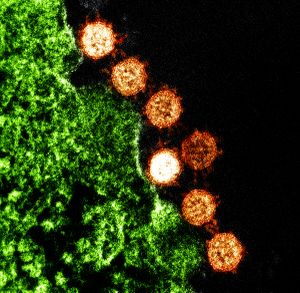SARS Severe Acute Respiratory Syndrome: Difference between revisions
No edit summary |
No edit summary |
||
| Line 14: | Line 14: | ||
* Most patients identified with SARS were previously healthy adults aged 25–70 years<ref>WHO [https://www.who.int/health-topics/severe-acute-respiratory-syndrome#tab=tab_1 SARS] Available from:https://www.who.int/health-topics/severe-acute-respiratory-syndrome#tab=tab_1 (last accessed 30.11.2020)</ref>. | * Most patients identified with SARS were previously healthy adults aged 25–70 years<ref>WHO [https://www.who.int/health-topics/severe-acute-respiratory-syndrome#tab=tab_1 SARS] Available from:https://www.who.int/health-topics/severe-acute-respiratory-syndrome#tab=tab_1 (last accessed 30.11.2020)</ref>. | ||
Image: Colorized transmission electron micrograph of Severe Acute Respiratory Syndrome (SARS) virus particles (orange) found near the periphery of an infected cell (green). | Image: Colorized transmission electron micrograph of Severe Acute Respiratory Syndrome (SARS) virus particles (orange) found near the periphery of an infected cell (green). | ||
== Etiology == | |||
SARS-CoV is thought to have jumped from an animal reservoir in the horseshoe bat through an intermediate host in the palm civet and then to humans. | |||
* Coronaviruses are named for their crown-like glycoprotein spikes on their surface. | |||
* Coronaviruses are large single-stranded RNA viruses that have helical nucleocapsids. | |||
* They are usually associated with humans with the common cold, though, and in animals, they’re linked with a highly virulent disease<ref>Hodgens A, Gupta V. Severe Acute Respiratory Syndrome. [Updated 2020 Oct 5]. In: StatPearls [Internet]. Treasure Island (FL): StatPearls Publishing; 2020 Jan-..Available from:https://www.ncbi.nlm.nih.gov/books/NBK558977/#article-28937.s2 (accessed 29.11.2020)</ref> | |||
== Sub Heading 2 == | == Sub Heading 2 == | ||
Revision as of 07:08, 29 November 2020
This article or area is currently under construction and may only be partially complete. Please come back soon to see the finished work! (29/11/2020)
Original Editor - Lucinda hampton
Top Contributors - Lucinda hampton and Rishika Babburu
Introduction[edit | edit source]
Severe acute respiratory syndrome (SARS) is a viral respiratory disease caused by a SARS-associated coronavirus. It was first identified at the end of February 2003 during an outbreak that emerged in China and spread to 4 other countries.
- Airborne virus and can spread through small droplets of saliva in a similar way to the cold and influenza. It was the first severe and readily transmissible new disease to emerge in the 21st century and showed a clear capacity to spread along the routes of international air travel.
- Can also be spread indirectly via surfaces that have been touched by someone who is infected with the virus.
- Most patients identified with SARS were previously healthy adults aged 25–70 years[1].
Image: Colorized transmission electron micrograph of Severe Acute Respiratory Syndrome (SARS) virus particles (orange) found near the periphery of an infected cell (green).
Etiology[edit | edit source]
SARS-CoV is thought to have jumped from an animal reservoir in the horseshoe bat through an intermediate host in the palm civet and then to humans.
- Coronaviruses are named for their crown-like glycoprotein spikes on their surface.
- Coronaviruses are large single-stranded RNA viruses that have helical nucleocapsids.
- They are usually associated with humans with the common cold, though, and in animals, they’re linked with a highly virulent disease[2]
Sub Heading 2[edit | edit source]
Sub Heading 3[edit | edit source]
Resources[edit | edit source]
- bulleted list
- x
or
- numbered list
- x
References[edit | edit source]
- ↑ WHO SARS Available from:https://www.who.int/health-topics/severe-acute-respiratory-syndrome#tab=tab_1 (last accessed 30.11.2020)
- ↑ Hodgens A, Gupta V. Severe Acute Respiratory Syndrome. [Updated 2020 Oct 5]. In: StatPearls [Internet]. Treasure Island (FL): StatPearls Publishing; 2020 Jan-..Available from:https://www.ncbi.nlm.nih.gov/books/NBK558977/#article-28937.s2 (accessed 29.11.2020)







